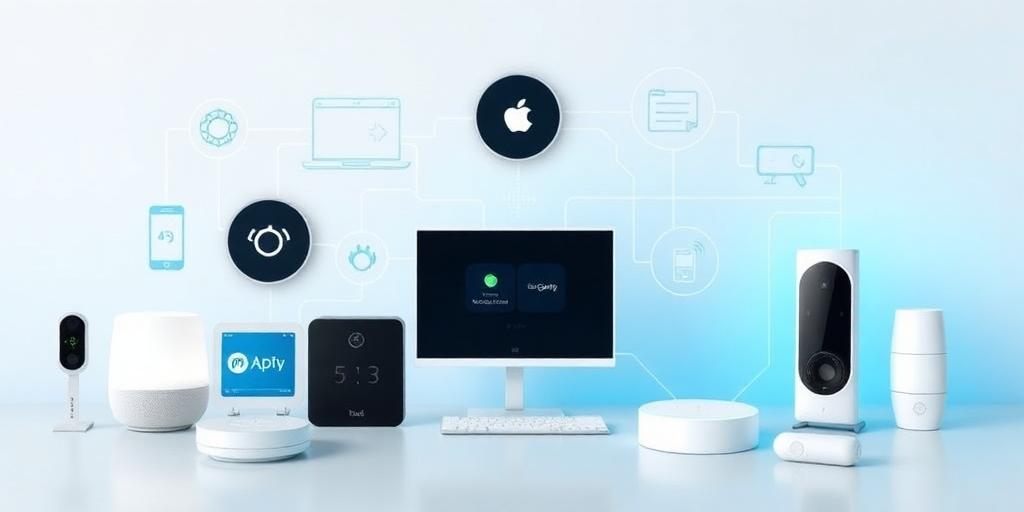Matter Protocol Explained: The Future of Smart Home Interoperability
In the rapidly evolving world of smart home technology, interoperability has long been a challenge. Different devices from different manufacturers often operate on different protocols, creating a fragmented and often frustrating user experience. Enter Matter, a new protocol designed to unify the smart home ecosystem. This article provides an in-depth look at the Matter protocol, its benefits, and its potential to shape the future of smart homes.
What is Matter?
Matter is an open-source, royalty-free connectivity standard that enables smart home devices from different manufacturers to communicate with each other seamlessly. It's designed to be a universal language for smart home devices, ensuring they can all work together, regardless of the brand or ecosystem. The Connectivity Standards Alliance (CSA), formerly the Zigbee Alliance, developed Matter. Over 200 companies, including tech giants like Apple, Google, Amazon, and Samsung, support it. This broad industry backing signals a significant shift towards a more unified smart home experience.
Key Benefits of Matter
- Interoperability: The primary goal of Matter is to ensure that devices from different manufacturers can work together without compatibility issues. This means users are no longer locked into a single ecosystem and can choose devices based on their needs and preferences.
- Simplicity: Matter simplifies the setup and control of smart home devices. With a unified standard, adding new devices to your network becomes more straightforward, reducing the technical hurdles for the average user.
- Reliability: By using proven technologies like Wi-Fi, Ethernet, and Thread, Matter ensures a reliable and stable connection between devices. This reduces the chances of devices disconnecting or malfunctioning.
- Security: Security is a core component of the Matter protocol. It incorporates robust encryption and authentication mechanisms to protect against unauthorized access and ensure user privacy.
- Future-Proofing: Matter is designed to be adaptable and future-proof. It supports over-the-air (OTA) updates, allowing devices to receive new features and security enhancements as the standard evolves.
How Does Matter Work?
Matter operates on the Internet Protocol (IP), allowing devices to communicate over existing home networks. It supports multiple communication protocols:
- Wi-Fi: For high-bandwidth devices like security cameras and smart TVs.
- Ethernet: For devices that require a wired connection for enhanced reliability.
- Thread: A low-power, mesh networking protocol ideal for battery-powered devices like sensors and smart locks.
- Bluetooth Low Energy (BLE): Used primarily for device commissioning and setup.
Matter vs. Other Smart Home Protocols
Several smart home protocols have been around for years, including Zigbee, Z-Wave, and Bluetooth. While these protocols have their strengths, they often lack the universal interoperability that Matter aims to provide. Here's a comparison:
- Zigbee and Z-Wave: These are mesh networking protocols commonly used in smart home devices. However, they require a dedicated hub and are not directly IP-based, limiting their interoperability with other IP-based devices.
- Bluetooth: While widely used, Bluetooth is primarily designed for short-range communication and is less suitable for large-scale smart home networks.
- Matter: Matter unifies these different protocols by providing a common IP-based language that allows them to communicate seamlessly. It also eliminates the need for proprietary hubs, as devices can connect directly to the home network.
The Impact on Consumers
The Matter protocol promises to revolutionize the smart home experience for consumers. By addressing the interoperability challenge, it allows users to:
- Choose Devices Freely: Consumers can select devices from different manufacturers without worrying about compatibility issues. This promotes competition and innovation in the smart home market.
- Simplify Setup and Management: Adding new devices to the smart home network becomes easier and more intuitive. Users can manage all their devices from a single app or platform.
- Enhance Reliability and Security: Matter ensures a stable and secure connection between devices, reducing the risk of malfunctions and security breaches.
- Reduce Costs: By eliminating the need for proprietary hubs and reducing compatibility issues, Matter can lower the overall cost of setting up and maintaining a smart home.
Challenges and Future Outlook
Despite its potential, Matter faces several challenges:
- Adoption Rate: The success of Matter depends on widespread adoption by manufacturers and developers. While many major players support the protocol, it will take time for all devices to become Matter-compatible.
- Legacy Devices: Existing smart home devices that are not Matter-compatible may require firmware updates or new hardware to work with the protocol. This could create a barrier for some users.
- Complexity: Implementing Matter can be complex, especially for smaller manufacturers. Ensuring compliance with the standard requires significant technical expertise and resources.
Looking ahead, the future of Matter is bright. As more devices become Matter-compatible, the smart home experience will become more seamless, reliable, and secure. Matter has the potential to unlock new possibilities for smart home automation and create a more connected world.
Conclusion
The Matter protocol represents a significant step forward in the evolution of smart home technology. By addressing the interoperability challenge and providing a unified standard for smart home devices, Matter promises to create a more seamless, reliable, and secure user experience. As the protocol gains wider adoption, it has the potential to transform the smart home market and unlock new possibilities for connected living.









